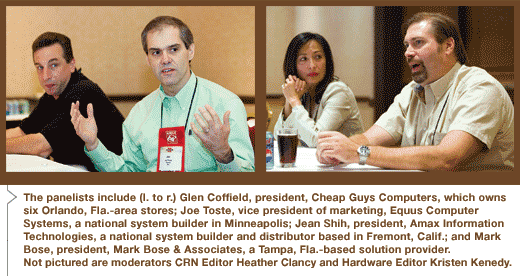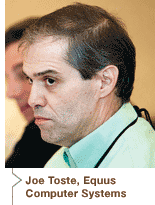The Industry Buzz: Storage, Storage, Storage

\
\
Executives at the
CRN
System Builder Roundtable cited storage as the No. 1 opportunity for custom-system builders over the next year, but were divided over the threat posed by Best Buy's small-business initiative and viewed the retention of good technicians as a major problem.
The roundtable, convened during the XChange Tech Connect conference in Las Vegas in May, represented a variety of business models. The following are excerpts from the discussion.
| /**/ /**/ |
NEW OPPORTUNITIES
The custom-system channel is continually scouting out new opportunities. When CRN asked the roundtable to pinpoint areas that will shine during the next 12 months, storage rose to the top of the list.

Mark Bose, Mark Bose and Associates:
Our big opportunity for probably the next year, year and a half, is [disaster preparedness]. Florida was touched by five hurricanes last year. Most people in a small-business environment never have a clue that the value of their entire IT has nothing to do with all that crap in the closet. It's the data. When you lose the data, you're dead.
And so what we're looking at doing—I'm in the final phase right now of trying to pick the partner to go with—is an off-site, online backup solution. The best rates I've found so far give me 20 percent margin on a sale. And the nice thing about it is I really don't have to do anything other than install the software, which I'm going to charge the customer for anyhow. They do all the billing and they just write me a check every year when the customer renews. We're really pushing it because hurricane season is just starting.
| AD | |
|---|---|
| id | unit-1659132512259 |
| type | Sponsored post |
Then I'm looking at some of the network-attached storage because now some of the manufacturers have started bundling in some of the software that will do images of all the machines on the network, which again makes it more of a brainless thing. In a small business, we can go drop it out on the desktops or drop it out on the network, and we don't have to screw around with it anymore.
Jean Shih, Amax: We see the storage channel is growing very fast with new technology like SAS and iSCSI drives. There is a lot of potential there.
CRN: Why is custom storage such a big opportunity right now?
Shih: No. 1, it's a need, right? When there are more and more networks, data and people that need a backup, they need storage. Plus, in storage, as far as Amax is concerned, we're not really competing against Dell or anybody. I mean, the market leader for storage is EMC. With EMC, the price is high. So there is still a good deal of room for us to go in there, to make money, to provide the service and the product.
CRN: What's the price point of your products?
Shih: Storage usually varies. It starts at about $1,000 but can go very high, like $20,000, $30,000, $40,000.
CRN: What would be the sweet spot for you?

Shih:
I would say around $8,000 to $10,000.
Joe Toste, Equus: We have had a similar experience. There is a lot of complexity involved in being able to configure that kind of storage correctly.
Glen Coffield, Cheap Guys: I was fortunate to get a customer that found us. They do video surveillance and the storage servers for casinos. They can't use an out-of-the-box solution. It's got to be specific because they're addressing every port on the RAID card individually. These guys are doing 16 500 Gbytes, now 16 750 Gbytes. It turns out to be a really good business.
Toste: Ask a multinational to configure a RAID 10 JBOD for a customer, and in a week they'll come back. It won't be right.
Bose: The other thing we're looking at doing is trying to come up with a service agreement model for our customers where, for so much per machine per month, we just deal with the maintenance issues. That has come into play as we got into some customers that grew. We'd be out there billing them $3,000 a month in labor for their office. People in the office would go, 'Somebody from your office is here, like, every day.' They started questioning what they were paying per hour. If it's $40 a machine per month or something, then we're not counting hours anymore. So we are trying to come up with a good model and a good number that will work where we can make money and keep the customer happy.
If we have somebody out in their office every month, even for two hours, it's a good reminder to them that we are here. It means when they go to buy something, they're more likely to go, 'Hey, Mark, what do I need? This is what I want to do, what do I need?' I'm not getting priced out, I'm not getting shopped.
GOING GREEN
Some of the system builders also see opportunities in the increasingly rigid regulations around the disposal of IT products, particularly LCD displays. CRN asked panelists what they're doing in the area of recycling.
Shih: We collect $8 for recycling. And now there are many more states writing to us because we have our Impression LCD. They'll write to us and they'll want us to give them proposals on how to dispose of their LCDs. We will take responsibility for it in whatever state. It's very costly.
Toste: We're starting to see that more certainly in education. In July, Minnesota is going to have the same CRT/LCD legislation that is in California. So we're finding we're getting more bids, white-box bids, where the schools are saying, 'You have got to give us a plan for how you're going to dispose of them, and you have to sign an affidavit saying that you are not going to resell them or dump them.' So we're going to offer a green program. We're going to offer the customer a particular SKU they can buy where we will provide life-cycle management, which includes disposal service.
SERVER SALES
Another area panelists thought showed potential was server sales. New processors from Advanced Micro Devices and Intel that use power more efficiently promise to boost the market.
Toste: The white-box server market probably took it in the chin last year. I think it was basically poor execution from Intel. But I think we will see the 1U and 2U white-box server market being huge.
And this whole thing of performance-per-watt in the data center is gigantic because, when you are talking about desktops, the refresh is five years, and we're seeing people throwing away 1U and application database servers that are not even two years old because they can't have these very warm/hot systems in the data center. Do you guys see the same thing?
Shih: Oh, yeah. Plus, in the data center, they really need high processing power. With the technology advancing so fast right now, after a year or two, they need to look at the new technology. They upgrade all their nodes.
Toste: I find it amazing how often people are refreshing servers. They are not even waiting two years.
Bose: Especially in the data center.
CRN: Which operating systems are going on those servers?
Bose: I think it's a combination. It's Linux and it's Microsoft. If it's Web servers, we see more Linux.
Coffield: Eudora.
Shih: We see more Linux-based software.
| /**/ /**/ |
COMPETITION
\
Talk to any system builder about competitive threats these days and the first thing you are likely to hear are complaints about Dell. System builders are finding ways to turn customers away from price-centric buying.
Bose: I'm finding in the small-business market that I am pulling out what people think are servers and they are just Windows 98 boxes.
Toste: Yeah, I think there's a lot of that.

Coffield:
Well, unfortunately, I think Dell has perpetuated selling the Celeron with 256 Mbytes [of RAM] for $299 and calling it a server.
CRN: How has Dell's current proliferation of these desktop processors for servers impacted you?
Bose: Well, it's actually great because they assume the end user is so stupid to believe that that is a solution. [Dell ran an ad during a recent channel event] for a Dell server priced at $199. It was a Celeron so old we couldn't even buy the chips anymore. It was 128 Mbytes of memory and FreeDOS or something like that for an operating system. They're sitting there telling us, 'Oh, you should partner with us.' And we're going, 'This is beyond bait-and-switch.'
Coffield: I have maybe a little bit different way of dealing with that. I buy Dell, and I give it to the customer and say, 'Here, go try this for a couple of days, see if it's going to meet your needs. If it is, I'll sell it to you.' I probably have in my warehouse at any given time 20 or 30 different Dell machines, brand-new in the box.
Bose: Customers have gotten smarter, and I don't think Dell has given them credit for that. Some people may be just stone stupid; most customers, when they see the ad and they start realizing that every day you can go to their Web site and their prices change on the same product, and we all know it doesn't cost $150 or $200 to ship a box that weighs 30 pounds from Texas to Florida. When you really start quoting apples-to-apples, when you start saying, 'OK, here's a configured server that they're offering you; now let's do a real configured server,' they're not the cheaper option. It's just very good marketing.
Coffield: You have to get them to talk to you ... 'You have a PC for $399? Well, let's talk about that for a second. Can I do one for $399? Sure, but let's talk about it. Let's go to their Web site and let's configure it the way that you're actually going to get it.' And all of a sudden, they're at $800, $900, $1,000, and you've got something to talk about now.
Bose: I've got a customer that's a plumber. They probably had five or six Dells in there at one time. Their server was a Windows XP Home machine because that's what the Dell person told them would work fine for them. And based on their experience that they've had with Dell—the calling and waiting and dealing with people who can't speak English and are reading off a script—they bought on-site service contracts with these Dells. But they still ended up calling us saying, 'I don't want to deal with those jackasses at Dell. Come take care of this.'
Coffield: But, of course, to a certain extent, Dell got the last laugh because they got the money for the service contract.
Bose: Right. But what happens is, the customer goes, 'I got screwed. It's never going to happen again.'
BEST BUY FOR BUSINESS
While Dell is somewhat of a known threat, panelists said they are watching carefully the growth of retail giant Best Buy's Best Buy For Business division. The division is focused on sales to the small-business market and has the kind of volume leverage that has helped Dell maintain an advantage in the market.
CRN: How serious of a threat is Best Buy For Business?
Coffield: Do you think a Wal-Mart is a professional car service facility?
Toste: Well, I disagree. I think Best Buy will be successful, clearly. I mean, we're in Minneapolis so we know what they're doing with Best Buy For Business and Geek Squad. They're getting 300 of their Geek Squad certified [with Microsoft]. It's not like they're going to take all of our business, but they will be successful.
Coffield: I think they'll be successful in major metropolitan areas. But I can give the customer the PC for what they charge to reload Windows in somebody's house. They're charging $300 to load Windows.
Bose: Well, they've got the mass-market appeal. They've got the advertising. It is kind of the same concept that Dell has. They have the print driving them, they've got the [message], 'We're part of a bigger company, so therefore we're a trusted solution.'
CRN: They probably also have a pricing advantage.
Toste: They do.
Coffield: Well, not for services, really.
Bose: Not for service.
Toste: You've got to look at every market, and every market commoditizes, right? So Dell commoditizes the big business and we've got to keep on adding more services. So similarly, just like small business has bought paper supplies from a local office supply [store], they started buying from Office Depot. So there's going to be some level of our services that's ... going to be commoditized. We'll have to build more value on. We have to keep on chasing the value.
Coffield: The dissatisfaction rating that we've seen from Geek Squad is immense in my market, immense.

Toste:
I take a different approach. I always take the paranoid approach. I always look at the scale and how serious they are. I believe they will be more successful than CompUSA based on their model. Again, it's a broad channel. I have to think, 'How do I defend [my business]? How do I build value on top of what we do today?' In that case, we're going to try to commoditize a lot of the [Microsoft] Small Business Server 2000 and some of the SBS 2003 services. Then we'll start to build. So [the focus is] how can we build and manage services for our resellers with SharePoint
and show them how they can compete and manage that service for managed services, as opposed to having an advantage over the Geek Squad.
KEEPING TALENT
Focusing on services is becoming more important for system builders. But to be successful in that space, they need good technicians, and panelists agreed that retaining good technicians is a big challenge. CRN asked what they are doing to keep their techs happy.
Bose: Everybody loses their talent. If you don't pay your talent enough and then they realize the kind of money that's out there, they're going to go elsewhere. I see that at a distributor in Tampa. They'll get a tech that is really superior in their abilities, and they're not there for six months because they realize, 'I can make a whole lot more money doing something else than I'm making here.'
Coffield: I have to say the best thing I ever did was put my techs on commission. It increased productivity by over 200 percent. Prior to that, our techs would work on one system at a time. They'd wait an hour and a half while Windows was loading on a system. When I put them on commission, all of a sudden they're working on four different systems—they've got these three doing reloads on a rack over here, these two running diagnostics
Toste: We give them more training. We have 12 locations—there is a lot of turnover in the Bay Area.
Shih:
Oh, yeah, it's terrible.
Toste: Minneapolis is a good job market, but it's harder to keep the techies. In Kansas, people work for you forever. But we try to do more training. We give them more MCP (Microsoft Certified Professional) classes. We give them a lot to keep on pushing the certifications. We've tried the same [commission] incentive programs, but we've got to keep that group of technicians focused in on solving technology problems.
Coffield: Orlando's a weird market, but I have virtually no turnover.
Shih: Our company does a lot of training, too. Not only do we train them, we send them out for classes and have outside people coming to train them. But in Silicon Valley, it's so easy for people to double their salary, and they just leave, right? So, actually, commission as an incentive—it's very interesting. I've been thinking about that for a long while.